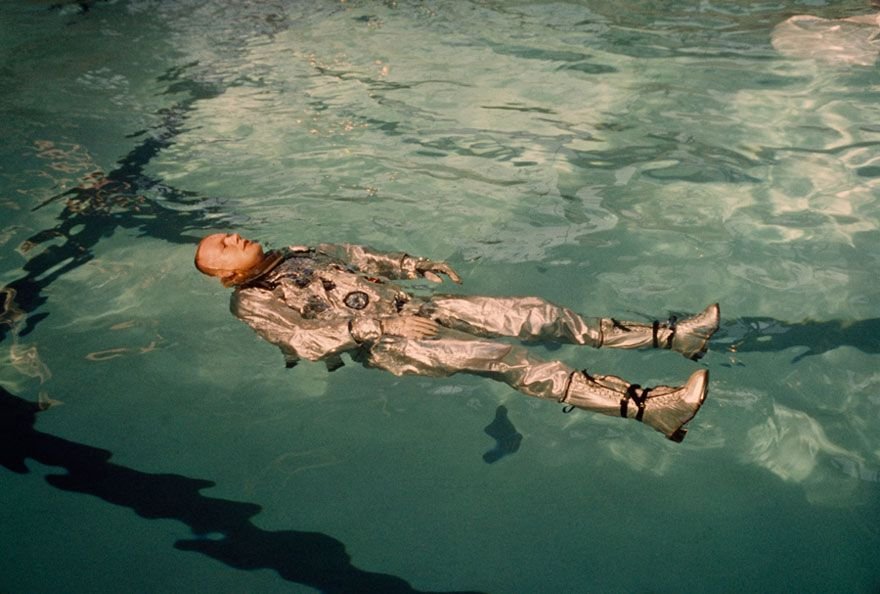Immersion Diuresis
I have never had the urge to pee so often than when I am spearfishing. After many bouts of folliculitis, I have come to understand that this as a well-studied physiological phenomenon known as Immersion Diuresis.
Neil Armstrong pissing his spacesuit (NASA 1967)
NASA scientists first put a name to this smelly spectacle in the 1960’s at the School of Aviation Medicine. During astronaut training in “anti-gravity” water simulations, Neil Armstrong must have soiled his million-dollar space suit one too many times. They defined immersion diuresis as “an excessive production of urine following immersion in cold water.”
When you kick through the kelp bed, fully submerged in 50-70°F water for more than an hour, your body temperature drops. To protect vital organs from the cold, your body reflexively constricts the blood vessels in your arms and legs, shunting warm blood to your core. The blood that once could occupy the full extent of your cardiovascular plumbing is now restricted to a smaller volume, and this is registered by the heart as an increase in pressure. This is in addition to the increased pressure from being underwater. Stretch receptors in the atrial chambers of your heart register this increase in fluid pressure and trigger a cascade of hormone secretion and suppression. Namely, the suppression of vasopressin, also known as antidiuretic hormone (ADH).
In the original experiments, scientists collected urine and blood from astronauts fully submerged for 7 days in water (in primitive wetsuits). The results we are interested in occurred in the first 6 hours. In the blood, they found significantly decreased levels of the critical hormone, vasopressin, among others including decreased cortisol, adrenaline, angiotensin, and aldosterone. They recorded a 10-15% decrease in blood pressure and heart rate, and a 107% increase in urine output. Wim Hof cites this study often as it is this same suppressive pathway that is implicated in the health benefits of cold water – not limited to, increased sex drive, social behavior, and fortified immune response.
Normally, vasopressin is secreted by the hypothalamus into the blood and acts on the kidney to decrease urine output, preserving the water and electrolytes for your body’s tissues. In cold water submersion, the perceived increased fluid volume due to vasoconstriction of the limbs tricks the body into thinking it needs to get rid of this all this extra fluid. The brain shuts off vasopressin release, and water and sodium are lost to urine at an abnormally fast rate.
Why does this matter to us?
The urge to pee while diving is based on false pretenses and is dehydrating. In fact, in the blood of the astronauts first tested, urine output, but interestingly not vasopressin, returned to normal at the 8th hour of submersion. It takes 8 hours for the body to realize that this state is unsustainable! This effect is important to realize during a long dive session, or a multi-day dive trip anywhere in the world where you string 4-5 3hr+ dives together. When you get out of the water after urinating 3-6 times in a session, the water from your muscles will be siphoned into your blood to recover the lost fluid volume. This directly causes feelings of fatigue, muscle weakness, and hunger. As I am sure we all have done, enjoying a few beers after a dive only further dehydrates you. Unless conscious and preventative with hydration, these multiday dive trips are hyper-dehydrating and likely taxing on your kidneys because you are essentially toying around with critical homeostatic hormones.

